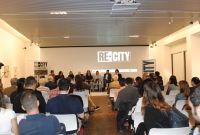Re-City is an international platform for Social Sustainability that wants to face the great global challenges of today and provide proposals for change and real transformation. It is a project that was born to Re-Think, Re-Plan and Re-Act from the cities to the main economic, social and environmental challenges that affect the planet.
The presentation of the Re-City platform, which took place at the Antoni Tàpies Foundation, which also collaborates on this project, was opened by the Councilor for International Relations of the Barcelona City Council, Laura Pérez, highlighting the importance of a project that manages to encompass different institutions and that wants to face the great global challenges from the city, inequalities, climate change, interculturality and the technological revolution. Pérez has argued that Barcelona is already a leader in social sustainability but that it should continue working together with the cities of the metropolitan area. "It is important to turn Barcelona into a benchmark for social sustainability worldwide," she said.
The director of the Re-City Platform, Gemma Sendra, highlighted each of the four challenges that Re-City addresses: "Fighting inequalities", "Facing climate change", "For an intercultural future" and "Technological revolution , social revolution ". Gemma Sendra has developed the three phases that each challenge will have: Re-Think, Re-Plan and Re-Act.
Re-Think, the first phase, is the reflection phase. It consists of a series of conferences, a seminar with academics where the speakers of the conference series and a lunch will be discussed with the business sector to explore the limits of the consensus. In this phase, a network of local academics is also created to continue working on the challenges, actually a network has already begun in the challenge of inequality. In the Re-Plan phase, a Social Sustainability Observatory is created to analyze the evolution of cities in relation to the defined indicators and identify successful policies. In this phase also a training plan for mayors, councilors and municipal technicians is developed to transfer knowledge and understand the territorial dimensions of the challenges. Finally, in the Re-Act phase, proposals are presented from the political and local world to incorporate them into the Strategic Metropolitan Plan. In this phase it is also planned to create a Hackaton for universities worldwide and the opening of an investment plan for social sustainability projects that address these challenges.
Xavier Ramos, professor of economics applied to the UAB, referred to the creation of the Academic Network of Inequalities, a network of researchers from interdisciplinary social sciences, political scientists, sociologists, economists, geographers and philosophers that address the problem of inequalities from various aspects.
Oriol Illa, director of the Area of ??International and Cooperation of the Àrea Metropolitana de Barcelona, ??emphasized the importance of a metropolitan vision to provide good services. "Metropolitan areas end up being places where social inequalities are likely to proliferate, or the creation of getos." The Àrea Metropolitana de Barcelona tries to provide services to the municipalities, therefore, the AMB has found a way to collaborate with this project and to share and compare with other metropolitan areas of the world. "
The major of Sant Boi de Llobregat, Lluïsa Moret, spoke of the importance of this initiative "capable of reflecting challenges that cities face every day." "It's important," said Moret, "to combine public, business, academic and social institutions. All the metropolis in the world, Moret added, have to face similar challenges."
Núria Parlon, major of Santa Coloma de Gramenet, has emphasized policies that help fight inequalities in the global arena. In this regard, she emphasized the importance of data to evaluate the results of social policies. Parlon insisted on the importance of finding spaces to debate and put on the table the great global challenges.
The event also had the participation of Jordi Alberich, businessman and former managing director of the Cercle d'Economia who participated in the lunch-debate of the cycle "Combating Inequalities". As a promoter of the Equity Business Group, Alberich has advanced three major conclusions that have been drawn from the meetings with businessmen in the Combating Inequalities cycle, these are, inequalities are increasing and breaking down societies, but at the same time, it is possible to stop this dynamic.
Finally, the ceremony was closed by Ernest Maragall, Councilor for Foreign Action, Institutional Relations and Transparency. Maragall emphasized that "this is an innovative project, a project that risks. It is a project that understands societies as a subject. To combat inequalities, the democratic power of societies must be increased. The Re-City platform is committed to the cities as subjects of government that assume responsibilities in front of their citizens, "concluded Ernest Maragall.










